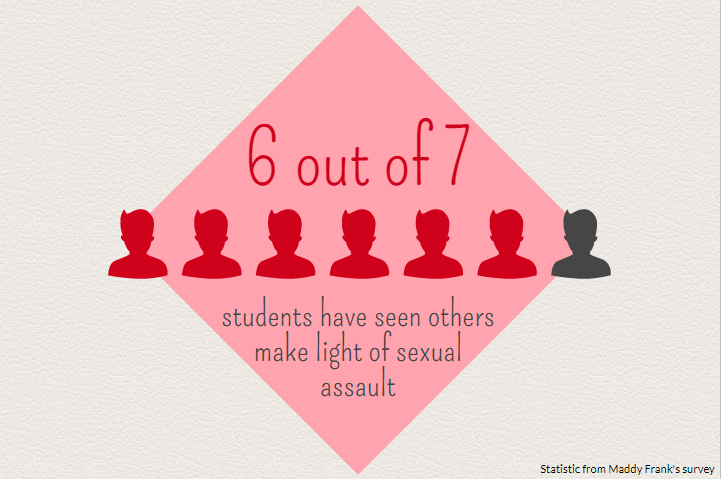Rape culture: a national problem, and a Whitman problem
March 3, 2018
The nationwide #MeToo movement has recently gained enough momentum to take down some of the most powerful Hollywood figures. As these men fall at the hands of those they once mistreated, conversations about abuse and harassment have become more frequent across America. And at Whitman, a school progressive enough to hold Sexism Seminars, it’s unsurprising that many of us would want to talk about it as well. But in our effort to be progressive, perhaps we like to talk too much about the nationwide picture. And as a result, we’ve let a related, smaller-scale issue slip out of focus—the rape culture culture in our own hallways.
Rape culture refers to an environment where sexual harassment is normalized, and it’s talked about—or joked about—like it’s an inevitable part of life, according to Marshall University. If we don’t address the vulgar things students say every day, Whitman will always be filled with students who perpetuate rape culture. We talk a big game about how we support the women getting justice in the #MeToo movement and how we hate Harvey Weinstein and Larry Nassar. But if we turn a blind eye to students joking about sexual assault, then we aren’t helping to make change where we actually can.
“We all say things like, ‘oh yeah I’m such a feminist,’ ” one senior girl said. “And then we say things like, ‘oh she’s such a slut.’ ”
I was recently horrified by a conversation I heard among a group of boys in the hallway. They jokingly teased a friend for “almost” getting raped by another boy, which they thought was hilarious because they were both guys.
That experience sparked a fire: I’d heard things like that too often and I was sick of it, so I decided to write. I first began asking what other students had heard. I heard similar stories—many a lot worse than mine. I understood that Whitman has a huge, infrequently discussed issue. We hold Sexism Seminars and assemblies about how to behave, but that isn’t enough. We’re letting horrible comments slide every day. Despite all our grand efforts, the oppressive environment hasn’t gotten much better.
In a survey of 50 Whitman students, 84 percent said that they had heard sexual harassment joked about in school. And of those, 79 percent said they hadn’t seen a change after the Sexism Seminars; some said things had actually worsened.
It happens all the time. They’re casual, joking comments, but the words delegitimize
those who have been abused and enable abusers. At the end of the day, we don’t do enough to stop the kids who make these comments. We double back on ourselves, first talking about the #MeToo movement with pride, but then accepting a culture of harassment.
In one anonymous survey response, a boy wrote that when someone dies in the video games he plays with his friends, they say the loser ‘was raped.’ A junior girl told me in an interview that she believed the boys in an academic club she was a part of were excluding her because she was female, and that she was once told to go make a sandwich for one of the male members.
Social media is often a haven for this behavior. Around 50 percent of my survey respondents said they had seen sexual harassment joked about on these platforms. One senior girl told me about a Whitman student Snapchat group called “RapeRape,” where kids share jokes about other Whitman students that live up to the group-chat’s name. Her report was confirmed by a sophomore who had also seen the chat.
As we read about sexual harassment and assault involving so many celebrities and prominent figures, we must continue this movement in own high school. We have to talk about what’s happening. And we have to stop letting things pass when we hear them. Saying something is how you make change.
It’s not enough to praise the brave survivors in the #MeToo movement. Instead, we need to continue the movement in our own hallways. Students found or reported to be engaging in this kind of vulgar behavior should be disciplined by administrators. Taking action against sexual harassment and the perpetuation of rape culture is the only way people truly learn the harm behind their all-too-common behavior.









Makemyburdenlight • Jul 15, 2022 at 5:53 am
Seems ironic to be talking about sexual assault in school named after a pedophile.